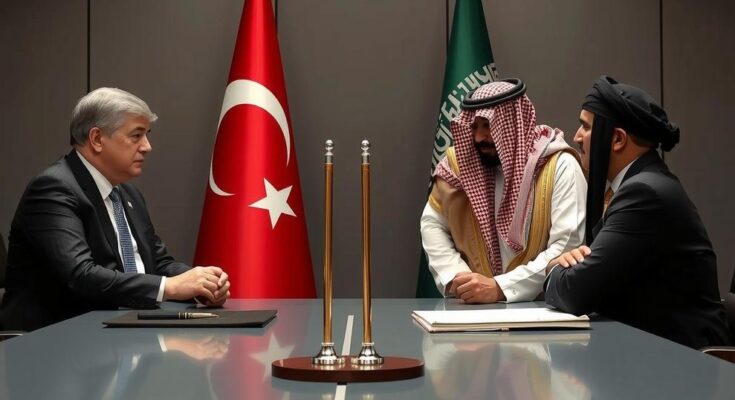Turkey seeks support from Saudi Arabia and the UAE to stabilize Syria after the fall of Assad. The Turkish government aims to avoid past mistakes and promote a neutral government structure that doesn’t threaten regional neighbors while grappling with Russia’s military presence and seeking funding for reconstruction efforts.
Turkey is actively seeking support from Saudi Arabia and the United Arab Emirates concerning the ongoing political transition in Syria following the rapid decline of Bashar al-Assad’s regime. Officials in Ankara exercise caution, aiming to avoid past missteps seen during the Arab Spring, and understand the necessity of collaboration with both regional allies and Western nations for stabilizing the region. President Recep Tayyip Erdogan is engaging Gulf nations, whose apprehension towards groups like the Muslim Brotherhood reflects the need for their long-term backing for Syria’s future governance.
Erdogan is set to meet with Egyptian President Abdel Fattah el-Sisi, as they share concerns about the rising influence of Hay’at Tahrir al-Sham (HTS) in Syria. This engagement indicates Ankara’s intent to not merely engage in discussions, but to maneuver through the intricate geopolitical landscape to influence the agenda effectively. While Turkey has denied direct support for HTS publicly, its awareness and connection to the group are evident. Turkish Foreign Minister Hakan Fidan affirms Turkey’s superior knowledge regarding HTS, underscoring Ankara’s involvement in coordinating international responses amid challenges.
Furthermore, Turkish ambitions point towards an inclusive, neutral Syria, where no external powers dominate, calling for cooperative regional governance. Fidan emphasized the importance of a cooperative regional order devoid of both Iranian and Turkish hegemony. Initial discussions indicate that Turkey’s overtures may have influenced shifts in rhetoric from Gulf leaders, showcasing an altering stance towards Syria.
Turkey recognizes the necessity for reconstruction efforts and funding from Gulf nations and Western powers. The European Union has signaled its willingness to engage in these recovery efforts. However, the presence of Russian military forces poses a significant obstacle. Some European leaders assert that Russian withdrawal is a prerequisite for supporting Syria’s new governance. Turkey is hopeful for recognition by both Russia and Iran regarding the HTS-led administration, looking towards a collaborative endeavor to reconstruct Syria and stabilize the region.
The situation in Syria has deteriorated under Assad’s regime, necessitating foreign involvement for its stabilization. Turkey, having emerged as a significant player in the Syrian crisis, seeks to prevent a repeat of historical missteps that exacerbated regional instability during the Arab Spring. As the crisis evolves, the need for a neutral governance structure that does not threaten neighboring nations plays a critical role in Turkey’s diplomatic endeavors with regional powers such as Saudi Arabia and the UAE.
In summary, Turkey is strategically seeking the backing of Saudi Arabia and the UAE in its efforts to stabilize Syria post-Assad. With a focus on establishing a neutral Syrian government and addressing concerns related to regional domination by external powers, Turkey is taking proactive steps through diplomatic channels. However, the challenge of managing Russia’s military presence and ensuring adequate funding for reconstruction remains pivotal in Turkey’s agenda for Syria’s future.
Original Source: www.middleeasteye.net




